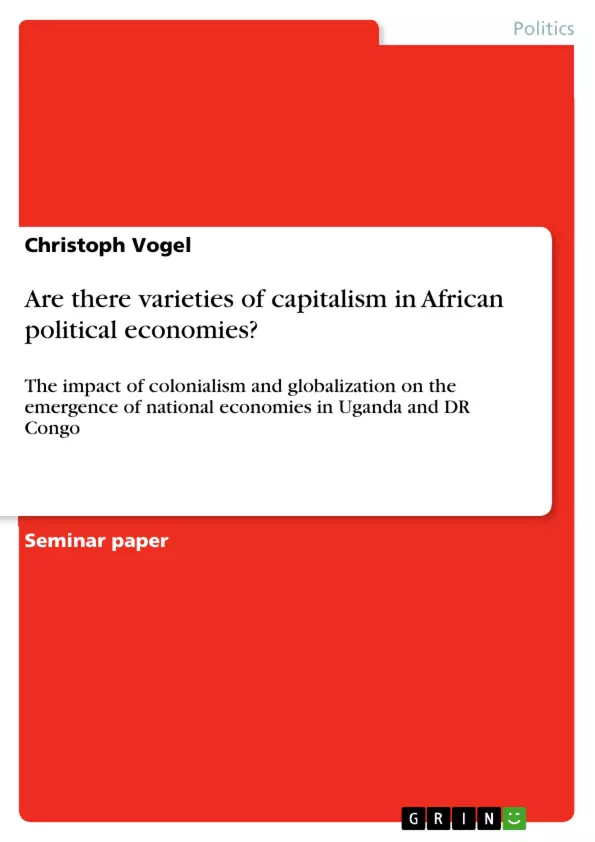Since the last decade scientific research on capitalism has experienced a noticeably grown
attention among scholars as well as politicians. One of the most discussed approaches in this
field of comparative analysis of political economy is the ‘varieties of capitalism’ theory1
developed by Peter Hall and David Soskice. Their approach basically focuses on how
different actors may behave in a certain politico-economic state configuration and on how
far this configuration can determine a national type or variety of capitalism as well as the
economic success of a political economy.
This approach, though, has been designed with a view to the so-called ‘developed
economies’, which are to be found in Western and Central Europe as well as in North
America. In the era of globalization other economies have come into play, with their
performances ranging from real success stories, as in several Asian economies, to
considerable failure, as in most marginalized Sub-Saharan African economies.
After presenting Hall and Soskice’s approach and some of its criticisms in order to
give a conceptual framework, this paper will provide a very brief overview of the political
economy of colonialism, followed by a case-study analysis of the contemporary political
economies of Uganda and the Democratic Republic of Congo (DRC).
The main research question is to identify to which extent varieties of capitalism
imported from colonial powers have fashioned today’s economies in the chosen cases as
‘economic models’ or how far the empirically established colonial economic systems are
responsible for post-colonial developments. The former colonial power in Uganda, Great
Britain, will be considered as a Liberal Market Economy, whereas DRC’s colonial power,
Belgium, will be assigned the Coordinated Market Economies2 type. In order to avoid
analytical shortcomings, this paper also tries to take into consideration the discrepancy
between those models and the colonial reality as well as postcolonial developments, which
have evolved due to domestic characteristics or as a consequence of a globalizing political
economy.
Inhaltsverzeichnis (Table of Contents)
- INTRODUCTION
- VARIETIES OF CAPITALISM AND ITS CRITIQUE
- THE VARIETIES OF CAPITALISM APPROACH
- CRITIQUE OF THE VARIETIES OF CAPITALISM APPROACH
- SOME NOTES ON POLITICAL ECONOMY IN COLONIAL AFRICA
- THE SITUATION IN UGANDA
- UGANDA'S POST-COLONIAL ECONOMY AT A GLANCE
- UGANDA'S VARIETY OF CAPITALISM
- THE SITUATION IN THE DEMOCRATIC REPUBLIC OF CONGO
- 'CONGO-KINSHASA'S' POST-COLONIAL ECONOMY AT A GLANCE
- DEMOCRATIC REPUBLIC OF CONGO'S VARIETY OF CAPITALISM
Zielsetzung und Themenschwerpunkte (Objectives and Key Themes)
This paper explores the extent to which varieties of capitalism imported from colonial powers have shaped contemporary economies in Uganda and the Democratic Republic of Congo (DRC). The main objective is to determine whether colonial economic systems have been influential in post-colonial developments. The analysis will focus on the impact of Liberal Market Economies (LMEs), as exemplified by Great Britain in Uganda, and Coordinated Market Economies (CMEs), represented by Belgium in DRC. It also investigates the role of domestic characteristics and globalization in shaping these economies.
- Varieties of Capitalism and its Critique
- Colonialism and its Influence on African Political Economy
- Post-Colonial Economic Development in Uganda and DRC
- The Role of Domestic Factors and Globalization
- The Applicability of Existing Varieties of Capitalism Typologies to African Cases
Zusammenfassung der Kapitel (Chapter Summaries)
- INTRODUCTION: The paper introduces the 'varieties of capitalism' theory by Hall and Soskice, highlighting its focus on actor-centered neo-institutionalism and its emphasis on firms as key agents of adjustment. The limitations of the theory for analyzing developing economies are acknowledged, and the research question regarding the influence of colonial economic systems on post-colonial development is established.
- VARIETIES OF CAPITALISM AND ITS CRITIQUE: This chapter presents the 'varieties of capitalism' approach, emphasizing its focus on firms' coordination mechanisms across five institutional spheres: industrial relations, vocational training and education, corporate governance, inter-firm relations, and employee relations. The two ideal types of national political economies, Liberal Market Economies (LMEs) and Coordinated Market Economies (CMEs), are introduced as analytical frameworks.
- SOME NOTES ON POLITICAL ECONOMY IN COLONIAL AFRICA: This section provides a brief overview of the political economy of colonialism, establishing a historical context for the analysis of Uganda and DRC.
- THE SITUATION IN UGANDA: This chapter examines Uganda's post-colonial economy, focusing on its development since independence. The chapter explores the influence of British colonialism and analyzes the country's economic model in light of the 'varieties of capitalism' framework.
- THE SITUATION IN THE DEMOCRATIC REPUBLIC OF CONGO: This chapter delves into the post-colonial economic situation in the DRC, analyzing the impact of Belgian colonialism and exploring the country's economic model within the framework of 'varieties of capitalism'.
Schlüsselwörter (Keywords)
The paper focuses on the analysis of varieties of capitalism, particularly in the context of post-colonial African economies. Key concepts include Liberal Market Economies (LMEs), Coordinated Market Economies (CMEs), colonialism, globalization, post-colonial development, and the specific cases of Uganda and the Democratic Republic of Congo.
- Quote paper
- Christoph Vogel (Author), 2009, Are there varieties of capitalism in African political economies?, Munich, GRIN Verlag, https://www.grin.com/document/181553



